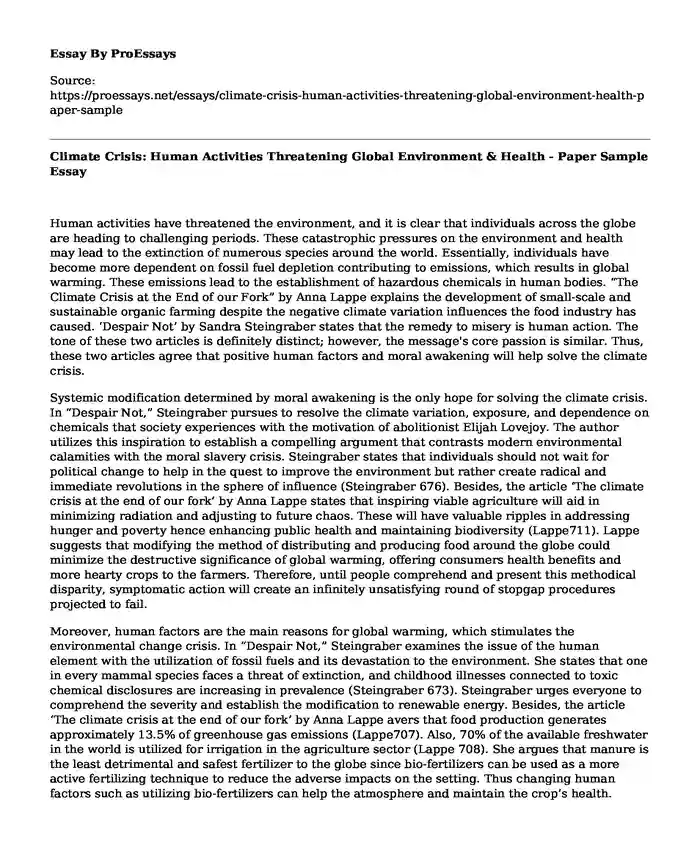Human activities have threatened the environment, and it is clear that individuals across the globe are heading to challenging periods. These catastrophic pressures on the environment and health may lead to the extinction of numerous species around the world. Essentially, individuals have become more dependent on fossil fuel depletion contributing to emissions, which results in global warming. These emissions lead to the establishment of hazardous chemicals in human bodies. “The Climate Crisis at the End of our Fork” by Anna Lappe explains the development of small-scale and sustainable organic farming despite the negative climate variation influences the food industry has caused. ‘Despair Not’ by Sandra Steingraber states that the remedy to misery is human action. The tone of these two articles is definitely distinct; however, the message's core passion is similar. Thus, these two articles agree that positive human factors and moral awakening will help solve the climate crisis.
Systemic modification determined by moral awakening is the only hope for solving the climate crisis. In “Despair Not,” Steingraber pursues to resolve the climate variation, exposure, and dependence on chemicals that society experiences with the motivation of abolitionist Elijah Lovejoy. The author utilizes this inspiration to establish a compelling argument that contrasts modern environmental calamities with the moral slavery crisis. Steingraber states that individuals should not wait for political change to help in the quest to improve the environment but rather create radical and immediate revolutions in the sphere of influence (Steingraber 676). Besides, the article ‘The climate crisis at the end of our fork’ by Anna Lappe states that inspiring viable agriculture will aid in minimizing radiation and adjusting to future chaos. These will have valuable ripples in addressing hunger and poverty hence enhancing public health and maintaining biodiversity (Lappe711). Lappe suggests that modifying the method of distributing and producing food around the globe could minimize the destructive significance of global warming, offering consumers health benefits and more hearty crops to the farmers. Therefore, until people comprehend and present this methodical disparity, symptomatic action will create an infinitely unsatisfying round of stopgap procedures projected to fail.
Moreover, human factors are the main reasons for global warming, which stimulates the environmental change crisis. In “Despair Not,” Steingraber examines the issue of the human element with the utilization of fossil fuels and its devastation to the environment. She states that one in every mammal species faces a threat of extinction, and childhood illnesses connected to toxic chemical disclosures are increasing in prevalence (Steingraber 673). Steingraber urges everyone to comprehend the severity and establish the modification to renewable energy. Besides, the article ‘The climate crisis at the end of our fork’ by Anna Lappe avers that food production generates approximately 13.5% of greenhouse gas emissions (Lappe707). Also, 70% of the available freshwater in the world is utilized for irrigation in the agriculture sector (Lappe 708). She argues that manure is the least detrimental and safest fertilizer to the globe since bio-fertilizers can be used as a more active fertilizing technique to reduce the adverse impacts on the setting. Thus changing human factors such as utilizing bio-fertilizers can help the atmosphere and maintain the crop’s health.
Conclusion
In a nutshell, the two articles offer a profound argumentative perspective of the probable solutions and numerous causes of global warming. If individuals despair and stop planning for variation, it will be more accessible to solve the crisis. For instance, Steingraber comprehends that the reaction to these pressures surpasses political policy execution. Individuals should awaken and face problems while executing solutions. Thus, citizens across the globe can change the world by practicing safe ways of preventing global warming.
Works Cited
Lappe, Anna. The Climate Crisis at the End of Our Fork.
Steingraber, Sandra. Despair Not.
Cite this page
Climate Crisis: Human Activities Threatening Global Environment & Health - Paper Sample. (2023, Nov 18). Retrieved from https://proessays.net/essays/climate-crisis-human-activities-threatening-global-environment-health-paper-sample
If you are the original author of this essay and no longer wish to have it published on the ProEssays website, please click below to request its removal:
- Change for Life and the Obesity Crisis - Social Marketing Paper
- STD at an Alarming Rate of Adults Paper Example
- Research Paper on Communication and Climate Change
- Nurse Leaders: Role, Insight & Advocacy - Essay Sample
- Essay on Evidence-Based Practice: Communication Strategies for Engaging New Nurses
- Paper Example on Alcohol Use Disorder: Identifying Risk with AUDIT & T-ACE
- Paper Example on Nursing Managers: Essential Members of the Nursing Fraternity







